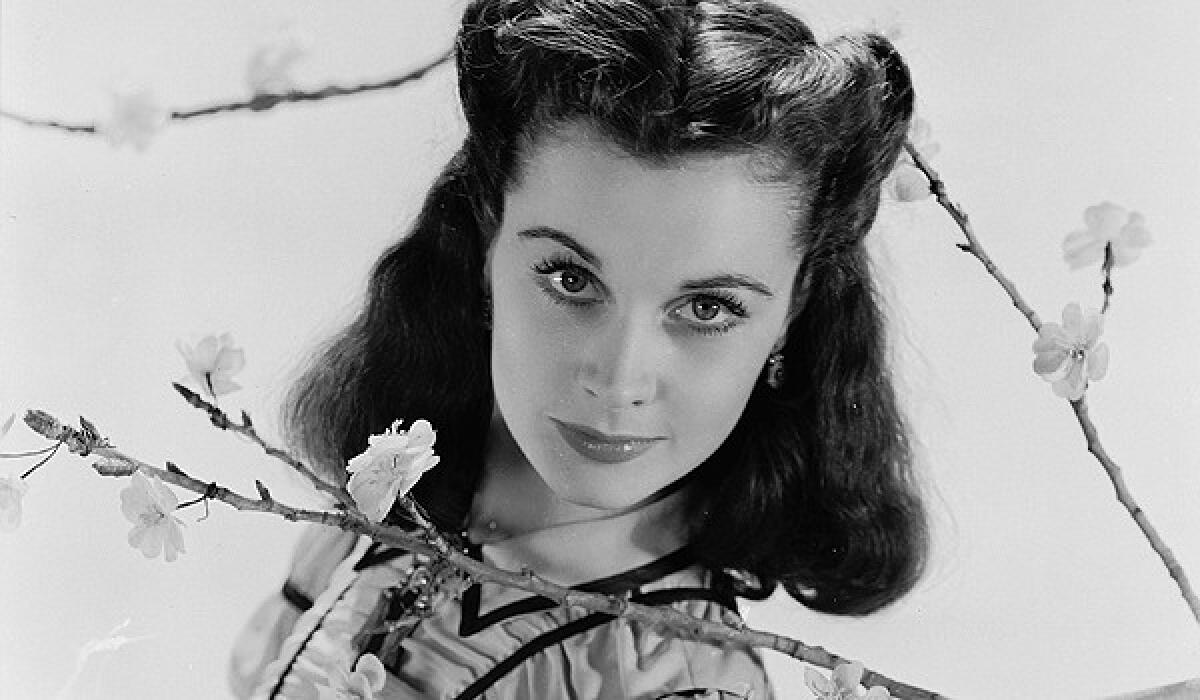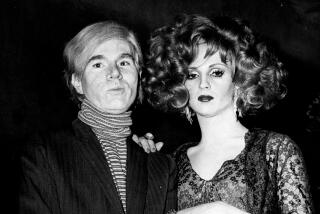Vivien Leigh, lavishly illustrated in a new biography

British actress Vivien Leigh had that undefinable star quality. For 30 years, the exquisitely beautiful Leigh captivated film and theater audiences with her well-crafted, magnetic performances.
In fact, Leigh won lead actress Oscars for creating two of the most indelible characters in screen history — the strong-willed, manipulative Southern belle Scarlett O’Hara in the beloved 1939 Civil War epic, “Gone With the Wind,” and Tennessee Williams’ fragile, faded Southern beauty Blanche DuBois in 1951’s “A Streetcar Named Desire.”
Her accomplishment is all the more remarkable because Leigh, who died at age 53, made only 19 movies.
PHOTOS: Vivien Leigh was more than just Scarlett O’Hara
The power and honesty of Leigh’s acting has not diminished with time, from her Scarlett declaring through her tears, “Tara. Home. I’ll go home, and I’ll think of some way to get him back. After all, tomorrow is another day” at the conclusion of “Gone With the Wind” or her heartbreaking descent into madness in “Streetcar.”
“There is something really visceral about her performances,” said British-based film scholar Kendra Bean, the author of “Vivien Leigh: An Intimate Portrait.”
The recently published, lavishly illustrated biography commemorating the actress’ centenary combines historical material, including documents from the archives of her second husband, Laurence Olivier, as well as interviews with those who knew her, including Tarquin Olivier, the celebrated actor’s son by his first wife, actress Jill Esmond.
“She never would have called herself a method actor by any means, but she really used her life experiences to forward these characters,” said Bean, who also writes the blog, https://www.vivandlarry.com.
PHOTOS: Behind-the-scenes Classic Hollywood
In her final two films — 1961’s “The Roman Spring of Mrs. Stone” and 1965’s “Ship of Fools,” she was cast as a lonely, aging woman looking for love. “Ship of Fools” director Stanley Kramer later said he believed Leigh knew she was “playing something like her own life, and yet she never, by word or gesture, betrayed any such recognition.”
Despite her film legacy, Bean said, Leigh wasn’t interested in being a Hollywood star. Both she and Olivier left Hollywood for London during the outbreak of World War II. “She wanted to be on stage,” Bean said.
Her theatrical collaborations with Olivier, to whom she was married from 1940 to 1960, are the stuff of legend — he even directed her in the London production of “Streetcar” — as were the glamorous parties she threw that were attended by the British and Hollywood elite, from Noel Coward to Gary Cooper.
British Prime Minister Winston Churchill was among her most ardent fans — Leigh and Olivier’s 1941 romantic drama, “That Hamilton Woman,” was his favorite film. But Leigh’s life was as complicated and ultimately as tragic as the heroines she played. Not only did Leigh battle chronic tuberculosis — she would die of the disease in 1967 — the actress also suffered from bipolar disorder for which she underwent shock treatments.
PHOTOS: Fall movie sneaks 2013
Because Leigh never wrote an autobiography and Olivier refused to be interviewed about her, there has been a lot of speculation, often sensationalized, about the couple’s star-crossed romance and often turbulent marriage.
But Leigh’s massive archives, which were recently donated by her grandchildren to the Victoria and Albert Museum in London, is shedding new light on their private lives. The files feature hundreds of letters, telegrams and photographs chronicling their romance, marriage, career and her bouts with depression.
Bean believes that Leigh looked up to Olivier as “sort of a mentor. She always referred to him as the greatest actor, even though she had her own talents. But as far as their personal relationship, it was really close in the beginning, and then there came a point where he couldn’t handle it because of her mental disorder. I think he had to move on.”
After their divorce, Olivier married actress Joan Plowright, with whom he had three children, and Leigh found happiness with actor Jack Merivale. “He was a really good influence on her. He was gentle and patient,” Bean said.
When Olivier went to Leigh’s flat on learning of her death, Merivale allowed him to be alone with his ex-wife before her body was removed.
Noel Coward, writing to Olivier after her death, said: “She always reminded me of a bird of paradise. Perhaps now she can find her own.”
More to Read
Only good movies
Get the Indie Focus newsletter, Mark Olsen's weekly guide to the world of cinema.
You may occasionally receive promotional content from the Los Angeles Times.







